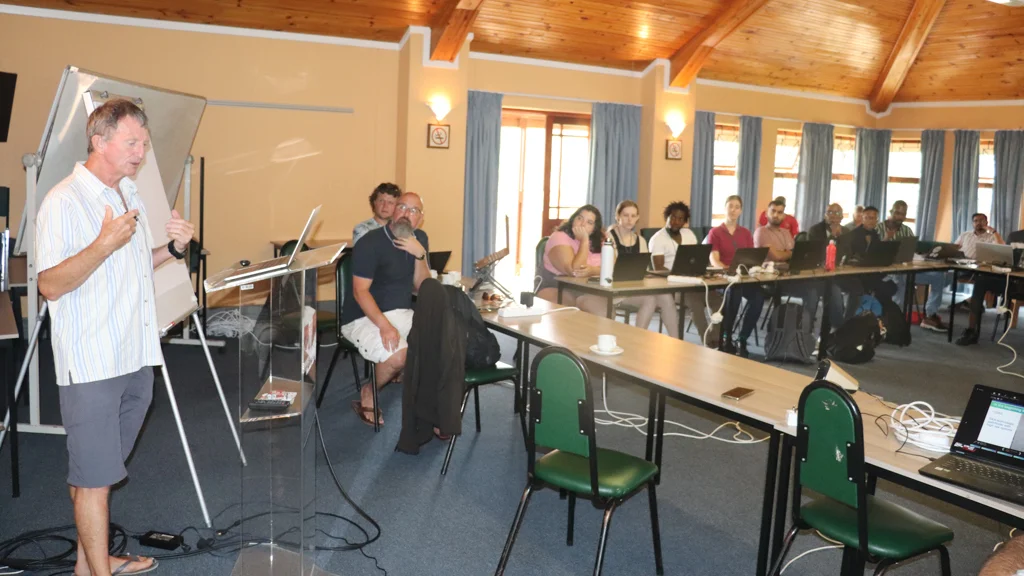
Twenty-two students from South African universities have converged at Rhodes University to participate in the MeerKAT Grand Tour Data Science workshop held from Sunday, 15 to Saturday, 21 January 2023.
The workshop, held at Rhodes University’s Continuing Education Centre, has also seen international lecturers sharing their knowledge with the students.
Funded by the South African Radio Astronomy Observatory’s (SARAO) Human Capital Development Programme, the workshop was held in collaboration with the Breakthrough Listen initiative, the MeerTime collaboration, the TRAPUM collaboration, the Transient Array Radio Telescope consortium and the Centre for Radio Astronomy Techniques and Technologies (RATT) in the Department of Physics and Electronics at Rhodes University.
Benjamin Hugo, head of the organising committee and Software Developer at SARAO, said that the MeerKAT Grand Tour student workshop aimed to give prospective and current masters students an overview of MeerKAT data reduction in a series of hands-on practicals. According to Hugo most students are starting their postgraduate studies, being early-career masters students from both astrophysics and engineering streams. “We aimed to expose new students to a wide range of topics. These sessions afforded students question-and-answer sessions. These hands-on sessions focused on masters students starting in 2023 and provided support for masters students in their final year who wish to pursue further cross-disciplinary research in continuum and time domains. The students had the opportunity to network with their peers and we hope that this will result in long-lasting research relationships,” said Hugo.
The topics that were covered offered students the opportunity to acquire the relevant skills in instrumentation and radio astronomy techniques, for example data analysis and visualisation, calibration and imaging using MeerKAT and the Rhodes Transient Array Radio Telescope, pulsar detection and timing on the MeerKAT array and exposure to the digital signal processing techniques employed by modern telescope electronics and the global Breakthrough Listen Search for Extraterrestrial Intelligence (SETI) network.
Stanley Kuja from Rhodes University and also a member of the organising committee, notes: “From these topics, the participating students will develop innovative technical, software development and statistical skills that can be applied in research as well as industry, for example medical imaging, telecommunications, space weather modelling and monitoring, defence, and data-intensive business analytics and financial industries. The development of these skillsets in early career researchers, coming from diverse backgrounds and disciplines, aligns well with South Africa’s National Research and Development plans to fully capitalise on the opportunities available within the global digital economy.”
Some of the topics that were covered include:
- Electronics and receivers using the L-band Transient Array Radio Telescope (TART) recently constructed at Rhodes University. Students were introduced to the front-end instrument electronics and calibration. Both topics are directly applicable to understanding the core concepts in the design of the MeerKAT receiver, digitisation and correlation chain. The TART sessions included a hands-on session with TART visibility data viewed and snapshot-imaged to monitor transitory Global Navigation Satellite constellations.
- Continuum imaging. The workshop discussed a range of continuum science topics for MeerKAT and teached prospective students the basics of interferometric calibration and imaging. This expanded upon the TART data session with subsets of MeerKAT visibility data. Students were exposed to a wide range of topics, from elementary to advanced, generally required to produce science-analysis-ready MeerKAT images.
- Pulsar searching and timing with MeerKAT. The exciting field of pulsar astronomy was discussed and provided students with the opportunity to search for pulsars in data of a nearby Globular Cluster as captured by the TRAPUM search backends. Having discovered their own pulsar, they were given the opportunity to explore concepts relating to pulsar timing with additional data from the MeerTIME backend. Through the art of pulsar timing, students learned how to obtain accurate system parameters of pulsars in relativistic binaries. They were introduced to commonly-used software stacks to search for and analyse pulsar data.
- The Breakthrough Listen project and MeerKAT’s Search for Extraterrestrial Intelligence. In recent years MeerKAT has joined the worldwide network of instruments searching the skies for signs that we are not alone. The scientific reasoning behind the SETI programme was discussed with the digital signal processing techniques, including Doppler searches, employed to analyse filterbank data taken with the Breakthrough Listen User Supplied Equipment (BLUSE) backend of the MeerKAT telescope.
The workshop featured lectures, invited talks and other contributions from:
Professor Justin Jonas from Rhodes University, SARAO and SKAO
Distinguished Professor Oleg Smirnov from Rhodes University and SARAO
Fernando Camilo, SARAO Chief Scientist
Stanley Kuja from Rhodes University
Keegan Trehaeven from Rhodes University
David MacMahon from University of California Berkeley
Daniel Czech from University of California Berkeley
Ruby van Rooyen from SARAO
Marisa Geyer from SARAO and University of Cape Town
Landman Bester from SARAO and Rhodes University
Benjamin Hugo from SARAO and Rhodes University
Tim Molteno from the University of Otago
Dr. Vivek Venkatraman Krishnan from the Max-Planck-Institut fur Radioastronomie, Bonn
